Call for Submissions for 2025 is Open
Global Labour University (GLU), in cooperation with the University of Kassel and Berlin School of Economics and Law (HWR Berlin), has issued a call for submissions to the competitive award in honour of critical political economist Elmar Altvater.
The award seeks to recognize outstanding work in the theoretically informed and ecologically-inclusive critiques of political economy.
It is open to a graduating thesis at the PhD level, with an award of 2,000€. We will consider submissions that have been accepted by an institution of higher education since 2022 in English or if in Spanish, Italian, German or Portuguese accompanied by a short article-length summary in English (3000 to 6000 words).
Applications are only accepted in electronic forms, to be sent before or at the very latest on June 30, 2025, to the following address: scherrer@uni-kassel.de
Professor Altvater was among the few academics in Germany who based his analysis of economic and political development on a critical reading of Marxian approaches to the cycles of growth, recession and crisis in modern capitalism. From the early 1970s until his death on the 1st of May 2018, his academic and political work also addressed the market rationality that enabled the destruction of nature, human labour, and all sorts of non-human life.
The prize aims to encourage young scholars to continue the tradition of critical thought about the degradation and destruction of nature as the ‘price of progress’ that Professor Altvater represented so outstandingly.
For any questions and further information, contact Prof. Dr. Christoph Scherrer: scherrer@uni-kassel.de
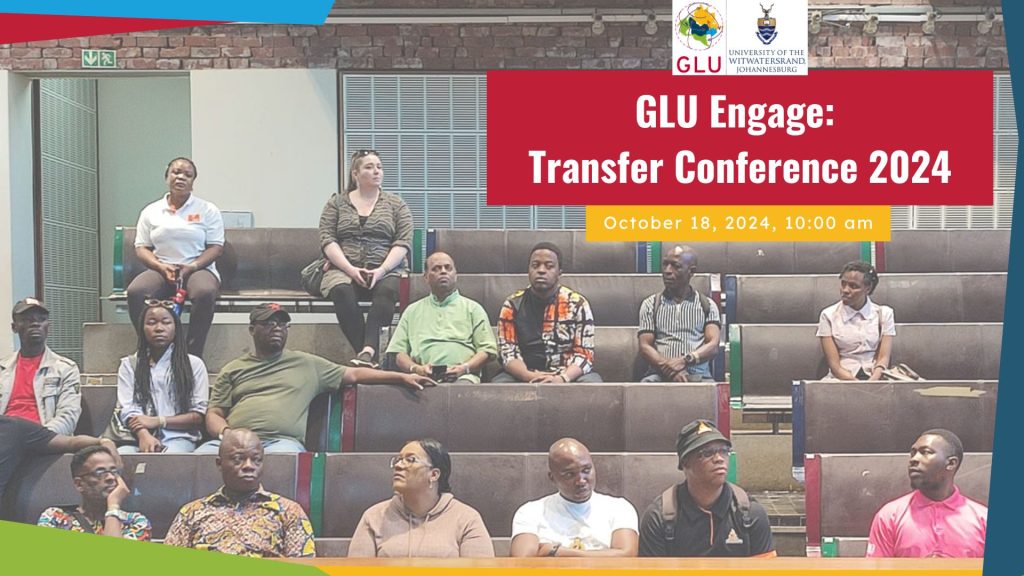
GLU South Africa is hosting its annual Engage Transfer Conference on Friday, 18 October. At the event, four African trade union groups will present their Power Resources Mapping research projects.
These research groups were formed earlier this year by GLU alumni and are comprised of representatives from respective workers’ organisations from Zimbabwe, Kenya, Cote d’Ivoire and Uganda. Namely, the Engage Transfer Project is enabling African GLU-Wits alumni to transfer some of their skills and knowledge acquired in the Engage South Africa short course to their local workers’ organisations and trade unions. To that end, several transfer workshops have been organised from May to July 2024.
The programme of the Conference will begin at 10:00 (UTC+2) and you are cordially invited to attend online. You can join the Zoom meeting via this link. All are welcome to attend online and engage in the presentations and GLU alumni.
The project is spearheaded by the University of the Witwatersrand and supported by the FES TUCC, local FES country offices, and other trade union organisations.
GLU South Africa and the FES TUCC are also hosting the annual GLU Africa Alumni meeting on Fri, 25 October. This is a hybrid meeting that takes place the day after the Engage South Africa short course graduation. It is designed to introduce our new alumni to the Africa network, their country and continental reps and to assist their integration into the wider GLU alumni space.
You can join the session via this link.

The application window for the GLU-SOLAIR ENGAGE-Asia Programme 2025 has been extended to October 31, 2024.
This is a five-month, blended Certificate Course programme consisting of two phases: an online phase and a residential/in-person phase. The residential phase is hosted at the School of Labor and Industrial Relations (SOLAIR) of the University of the Philippines Diliman.
The programme seeks to equip participants with essential knowledge and tools to actively participate in public discourse and influence policy-making and implementation in areas affecting workers and their organizations. The target audience is trade unionists, labour activists, and labour-orientated NGO affiliates from Southeast Asia, East Asia, South Asia, Australia, New Zealand, and the Pacific.
Access the full Call for Applications via this link.
The application process must be carried out online. To apply, complete the Online Application Form here.
More information is available via this web page.
For any inquiries, contact Vera Eileen V. Pupos, at vvpupos@up.edu.ph
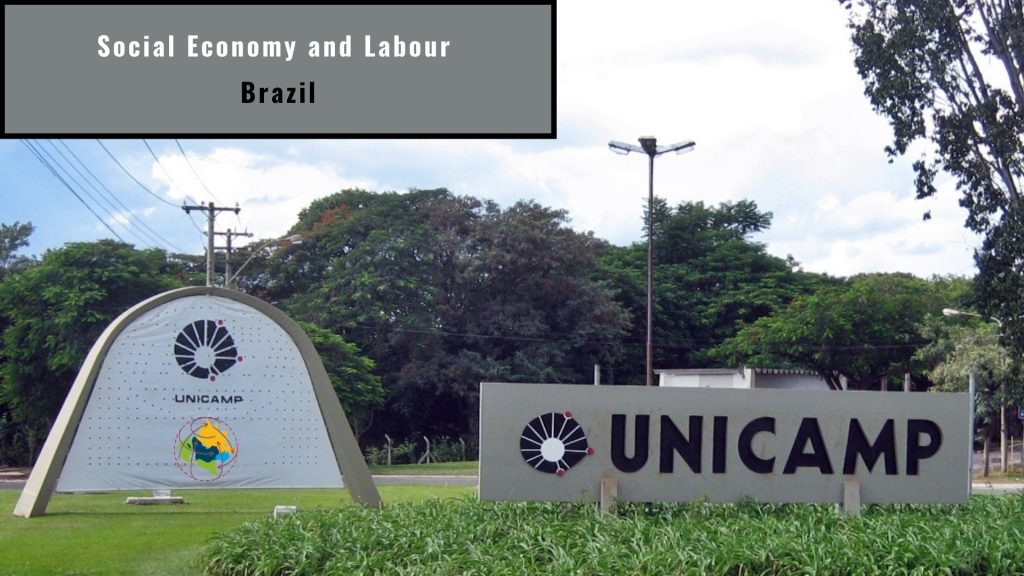
Send your applicaitons by October 31, 2024
Applications for the “Social Economy and Labour” MA programme are open until October 31, 2024.
This 1-year programme is taught at UNICAMP in the state of São Paulo, Brazil, by professors of the Institute of Economics and guest lecturers from other Brazilian universities and research institutes, as well as from the GLU partner universities.
It is designed to to assist workers and their organizations to challenge the current global context and engage more effectively in social dialogue, public debate and policy implementation. This includes economic development, macroeconomics, employment creation, strategies of multinational companies, inequality, poverty, social structure, gender equality, workers’ rights, social justice, labour relations, labour regulation and trade unionism perspectives, which are vital to enhancing labour movement capacities.
For any questions, please contact programme coordinator Hugo Dias: hugo.rodrigues.dias@gmail.com
Find out more via this web page.
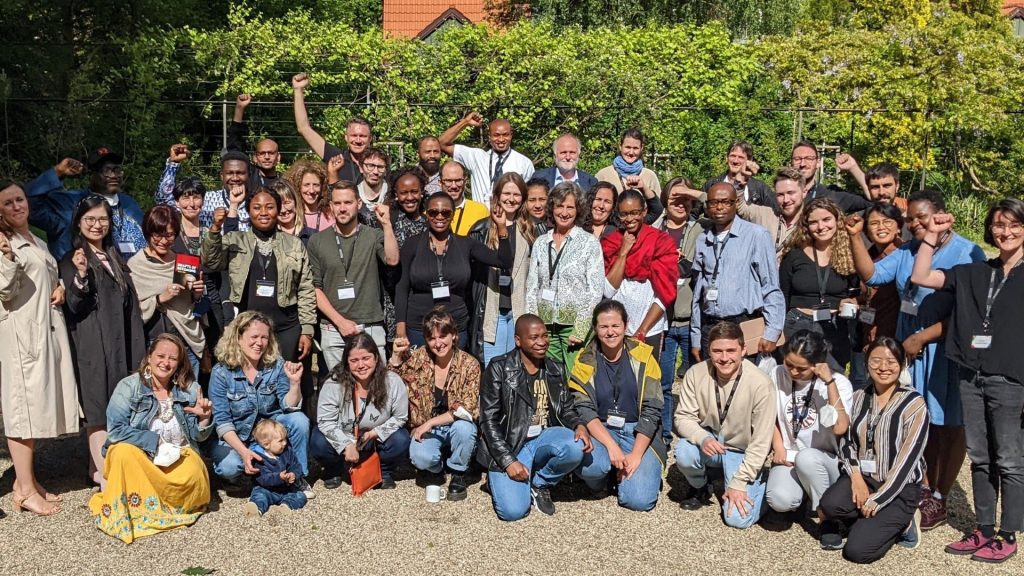
Send us your input!
Please submit the survey no later than September 15, 2024.
One lucky participant will also be selected at random from the respondents to receive a prize, which will be announced after the survey is closed- thank you in advance for your participation!”
In case you have changed your email address recently, please write to Matija Barisic, GLU Communications officer, at matija.barisic@global-labour-university.org to update your contact.
You can also access the online Alumni Database here.
If your old email address is there, Matija can help you open an account under your new email address.
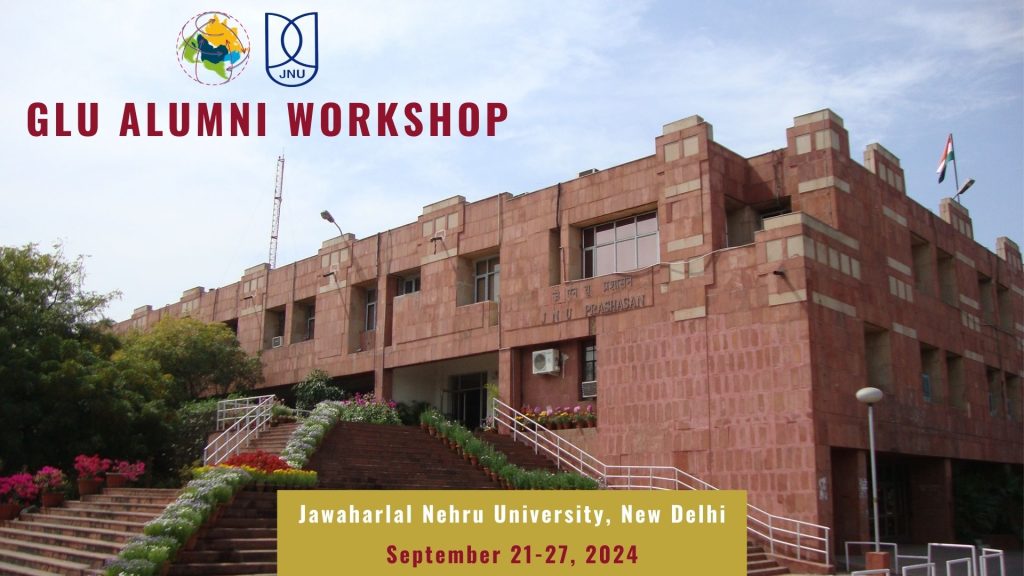
Global Labour University (GLU) is organising an Alumni Workshop for graduates from the GLU programmes between September 21 and 27, 2024, in New Delhi, India. The workshop provides a comprehensive reflection on the impact of just transition, gender equality, migration, and authoritarian regimes on the world of work and an analysis of trade union strategies responding to these challenges.
Learning from the various experiences in different countries, alumni are poised to expand their knowledge in this subject matter and strengthen their capacities for trade union work.
In preparation for the workshop, alumni were asked to develop a case study based on their experiences in their home countries, initiating a broader discussion and knowledge sharing on the topics. The workshop programme also combines the input of distinguished experts, practitioners, and field trips with the experiences of the alumni themselves.
During the first day of the Workshop, the participants got to know each other and started envisioning the future of the GLU Network while focusing on the current challenges that the working class is facing in different parts of the world.
Prof. Dr. Christoph Scherrer from the University of Kassel presented his analysis of some of the elements that play a role in a successful industrial policy implementation. Afterwards two plenary sessions took place. The first versed about the Labor Movement and their role in just and transformative transitions, focusing on different case studies from India. And the second focused on an analysis beyond Just transitions and envisioning possible paths towards ecosocialism.
The Alumni network is in particular focus of the GLU in 2024, which marks the 20th anniversary of the organisation. This year sees other alumni-focused activities, such as the hiring of the new alumni coordinator, the Alumni Stories series, other in-person events, etc.
If you have any inquiries regarding the event, feel free to contact the following email address: alumni-glu@uni-kassel.de
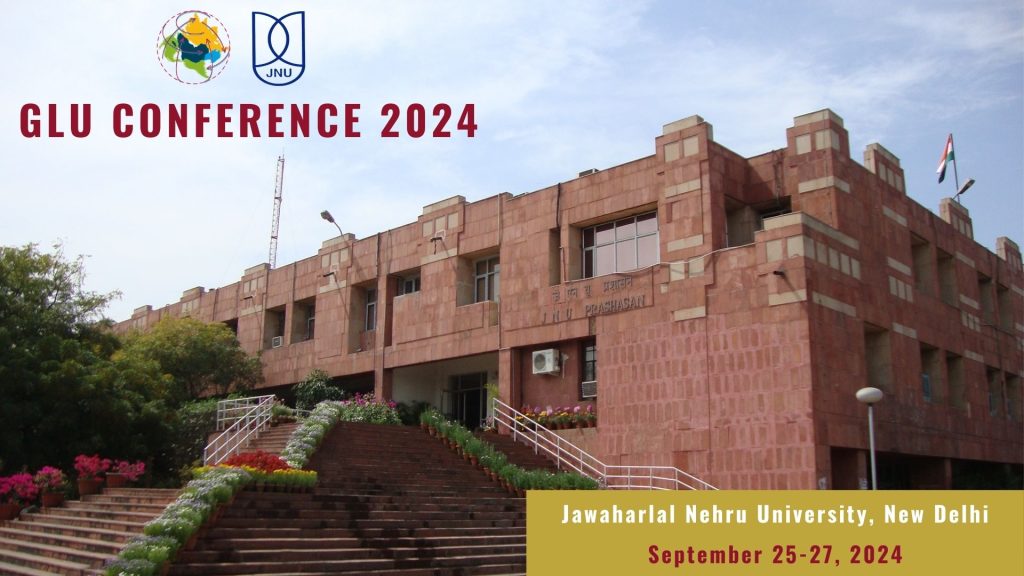
The annual GLU Conference is taking place from September 25 to 27, 2024, at the Jawaharlal Nehru University (JNU) in New Delhi, India.
This occasion is an opportunity to celebrate the achievements of the GLU network internationally and deepen the discussion on topics central to the network with GLU academics and Alumni, as well as members of national and international trade unions.
As part of the Conference planning, GLU issued a call for papers titled “Globalisation and Transition to an Egalitarian World: Resistance and Alternatives”, and selected proposals that will be presented at the conference.
A major cluster for the conference will focus on platform work and responsible global supply chains, as well as some broader questions related to policy interventions in response to the poly-crises of the current “world disorder. The following thematic clusters will be featured as well: labour regimes and policy, challenges of authoritarianism, global value systems, global care chains, solidarity economy, climate justice, and more.
Prof. Archana Prasad opened the GLU Conference by welcoming international visitors, underlining that this is the second GLU Conference held in India. Prof. Praveen Jha then introduced the work of Prof. Christoph Scherrer, who addressed the challenges in the current world political economy with the roles of China and the USA.
The Conference continued on the second day with three parallel sessions addressing labour regimes and policies, the solidarity economy, and the gig economy.
On the final day of the conference, we tackled a range of relevant labour topics.
Participants discussed the gig economy and the platform work, as well as experiences and lessons in reforms of Global Value Chains. Several study cases related to India were presented, including possible ways forward for Indian trade unions. Finally, we heard about 80 years of the Philadelphia Declaration, labour responses to the rise of right-wing authoritarianism, and shaping national law through international labour standards.
For more information on the event, stay tuned via our channels, or send a query to jnuglu2024@gmail.com.
You can find the Conference programme, as well as the schedule for parallel sessions below the text.
GLU organizes yearly conferences on topics of common interest in the network. The conferences take place at each GLU campus on a rotating basis and are an opportunity for members of the network to present their research, discuss new ideas and strengthen the network. After a Conference in South Africa in 2024, we are looking forward to meeting again our friends, colleagues, and associates in India.
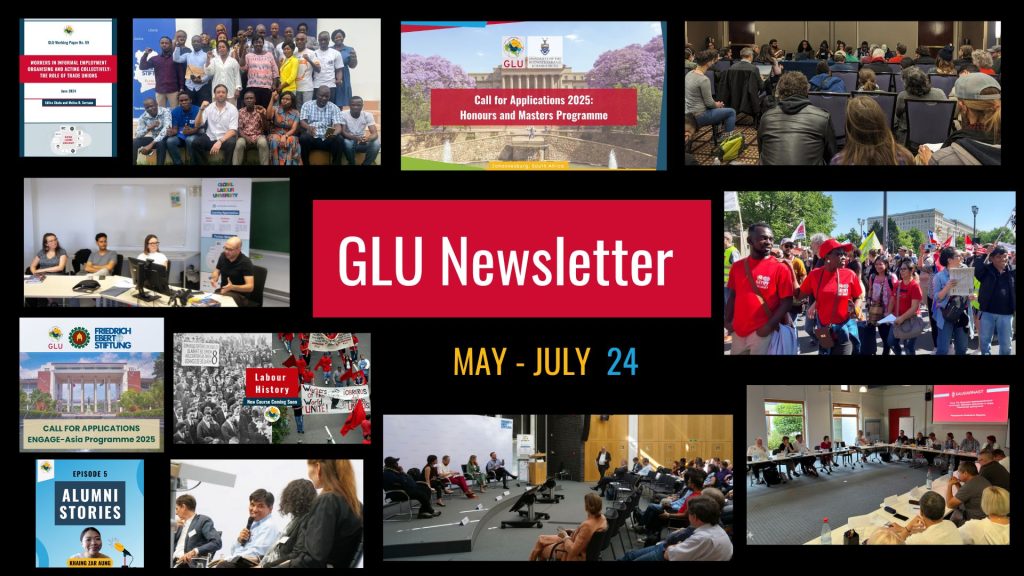
GLU Newsletter for the period of May – July 2024 is out. It contains the key updates, events, and activities from around the network, such as the GLU Annual Conference in India.
Make sure to subscribe via our website to keep up with news and get involved in GLU activities. You can also send a message to matija.barisic@global-labour-university.org.
In case you wish to submit a contribution to the GLU newsletter in the future, please write to the same email address.
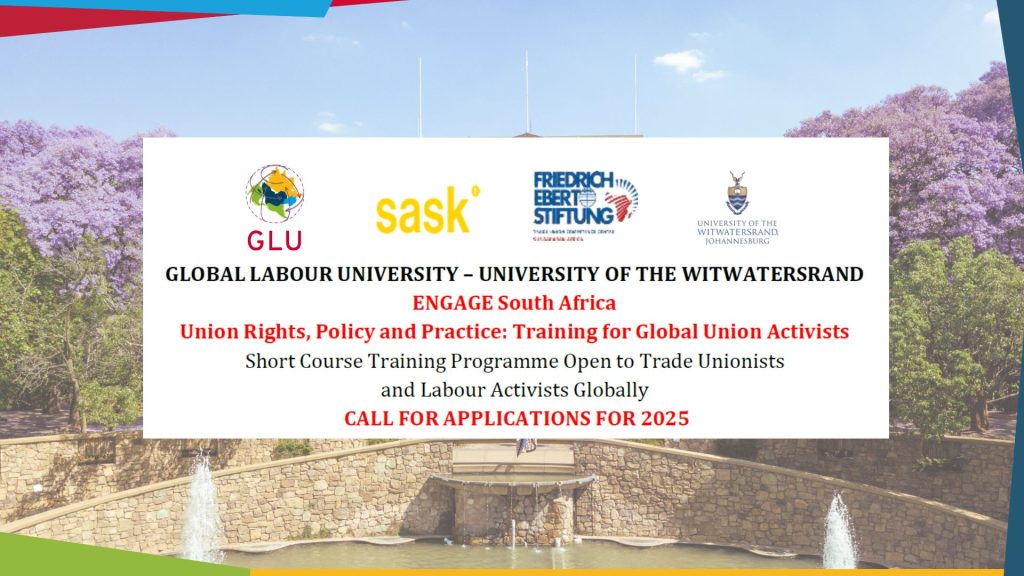
Submit your applications until December 19
Application for the ENGAGE South Africa course “Union Rights, Policy and Practice: Training for Global Union Activists” is now open.
This short course training programme is designed to trade unionists and labour activists globally, making it a unique international experience that offers new opportunities for global networking. It helps participants acquire additional knowledge and tools enabling them to take an active part in public debate and the process of policy formulation and implementation.
The course runs from September 1 to October 24, 2025, at the University of the Witwatersrand in Johannesburg, South Africa.
Closing date for applications is Friday, December 19, 2024. They should be submitted via email to Warren McGregor at: engage.southafrica@wits.ac.za.
The ENGAGE course receives support from the Friedrich Ebert Stiftung Trade Union Competence Centre for Sub- Saharan Africa (FES TUCC) and the Trade Union Solidarity Centre of Finland (SASK). There are a limited number of scholarships for accepted applicants from Africa, Asia and South America. Not all who are accepted can be funded.
Call for applications can be accessed here.
For more information, visit our partner’s web page.
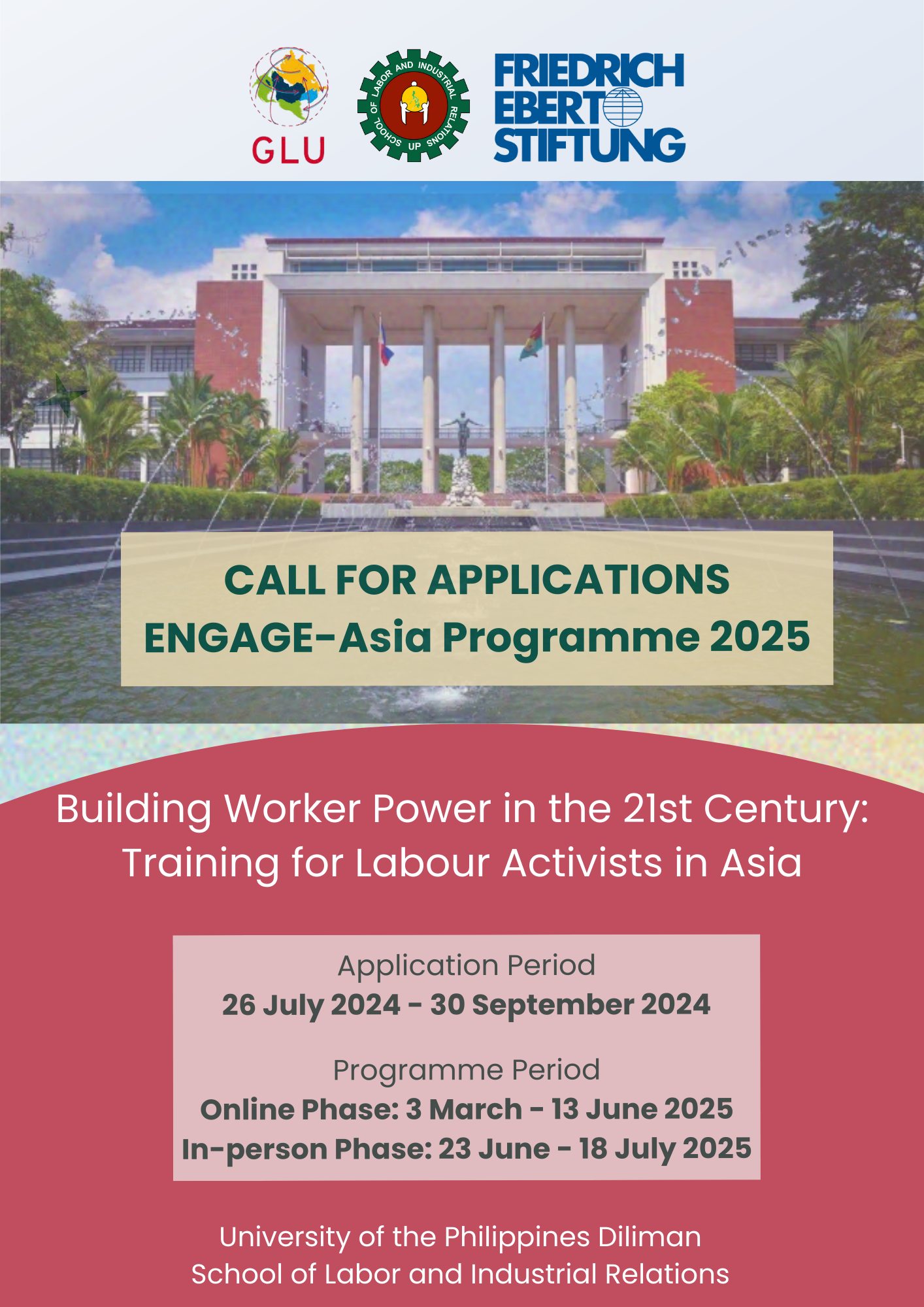
Applciations open until September 30
The application window for the GLU-SOLAIR ENGAGE-Asia Programme 2025 is now open.
ENGAGE-Asia is a five-month, blended Certificate Course programme consisting of two phases, an online phase and a residential/in-person phase. It seeks to equip trade unionists and labour activists with essential knowledge and tools to actively participate in public discourse and influence policy-making and implementation in areas affecting workers and their organizations.
The deadline for applications is September 30, 2024.
The course takes place from March to July 2025. The residential phase is hosted at the School of Labor and Industrial Relations (SOLAIR) of the University of the Philippines Diliman.
Target audience is trade unionists, labour activists, and labour-orientated NGO affiliates from Southeast Asia, East Asia, South Asia, Australia, New Zealand, and the Pacific.
You can find more information via this link. In case you have any questions, please contact Vera Eileen V. Pupos, at vvpupos@up.edu.ph
The programme is a collaborative effort between the Global Labour University (GLU) and the School of Labor and Industrial Relations at the University of the Philippines (UP SOLAIR), with the support of the Friedrich-Ebert-Stiftung(FES).